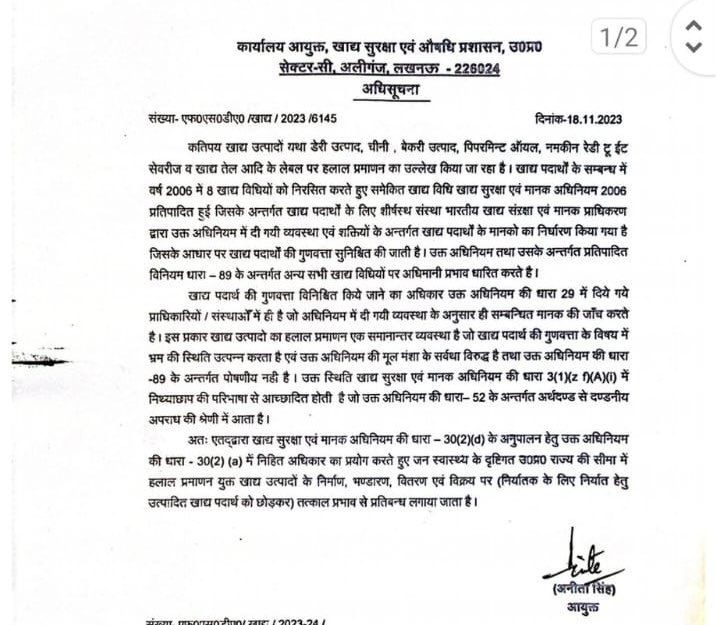More Coverage
Twitter Coverage
Satyaagrah
Written on
Satyaagrah
Written on
Satyaagrah
Written on
Satyaagrah
Written on
Satyaagrah
Written on
JOIN SATYAAGRAH SOCIAL MEDIA
"हलाल का हलाला, बेचाला": In a bold move of setting new standards by Yogi Adityanath, UP govt conclusively bans production, storage, sale of ‘Halal certified’ food items with immediate effect, citing violation of the Food Safety and Standards Act

In a decisive move by the Uttar Pradesh government, a ban on the production, storage, sale, and distribution of 'Halal certified' food items has been declared, citing it as contrary to the Food Safety and Standards Act. The ban, effective immediately as of 18th November, was announced shortly after reports surfaced of Chief Minister Yogi Adityanath's administration considering such a measure.
|
The directive, stemming from an order by the state's Food Safety and Drug Administration Commissioner, encompasses not only food products but also medicines and cosmetic items that carry the 'Halal certification.' This action reflects the state government's stance that the certification process runs parallel to, and thus undermines, the established national standards set by the Food Safety and Standards Authority of India (FSSAI).
In the notification number – FSDA Food/2023/6145, the government elaborated on its position, stating that the existence of a Halal certification system challenges the authority and the comprehensive framework of the FSSAI, established under the Food Safety and Standards Act of 2006. This legislation is the cornerstone of food safety and quality regulation in India, and the UP government's notification underlines its commitment to uphold these statutory provisions.
The ban represents a significant policy shift and is likely to have far-reaching implications for producers, retailers, and consumers of 'Halal certified' products in Uttar Pradesh. As this development unfolds, it is expected to ignite discussions on regulatory practices, religious certifications, and their place within the ambit of national food safety laws.
|
The Uttar Pradesh government's notification on the prohibition of 'Halal certified' food products has further elaborated on the specifics of the items affected. The notice identifies dairy products, sugar, bakery items, peppermint oil, ready-to-eat savories, and edible oils as among those that have been labeled with Halal certification. This certification is cited as being incongruent with the Food Safety and Standards Act of 2006, which established the Food Safety and Standards Authority of India (FSSAI) as the supreme entity overseeing food quality.
According to the notification, the Act, which consolidated provisions from eight prior laws, empowers the FSSAI as the sole authority to determine and enforce food quality standards. “As per Section 29 of the Act, FSSAI has been given the power to decide the quality of food items, and it is the only body authorised to check the concerned standards of the food items as per the provisions given in the Act,” the order detailed, emphasizing the central role of the FSSAI in regulating food safety.
Furthermore, the notification points out that the practice of Halal certification establishes a redundant system, leading to potential confusion regarding food quality and directly contravening the Act's primary objectives. “Thus, Halal certification of food products is a parallel system that creates confusion regarding the quality of food items and is completely against the basic intention of the said Act, and is not tenable under Section 89 of the said Act,” it stated.
|
Section 89 reinforces the precedence of the Food Safety and Standards Act over any other conflicting legislation, underscoring the government's standpoint that the Act is the ultimate authority on food safety and quality in India.
The Uttar Pradesh government has taken a stringent stance on 'halal certified' food products. In a directive aimed at safeguarding public health, the Food Commissioner's office has declared an outright ban on the production, storage, distribution, and sale of such items within the state. The order explicitly states, “In the interest of public health, production, storing, distribution and sale of halal certified edible items are banned in Uttar Pradesh with immediate effect,” marking a decisive administrative action.
Further expanding on the legal basis for this ban, the notification points to the Food Safety and Standards Act's definitions and penalties. It says, “The above situation is covered by the definition of counterfeiting in Section 3(1) (zf(A(i)) of the Food Safety and Standards Act, which comes under the category of an offence punishable with a fine under Section 52 of the said Act.”
|
Section 3(1) (zf(A(i)) of the Act describes "misbranded food" as any food product that is sold with false, misleading, or deceptive claims on its labeling, packaging, or advertising. The state government's notification clarifies that any violation of this provision is subject to punishment under Section 52 of the Act. This move by the Uttar Pradesh government indicates a rigorous application of food safety laws and a clear stance against what it views as a violation of these standards by the practice of 'halal certification'.
In a robust directive issued by the Uttar Pradesh state administration, entities have been warned of stringent consequences should they disregard the Act and the newly imposed ban on 'Halal certified' food products. The notification emphasizes the legal grounding of the order, stating that it is in accordance with Section 30(2)(d) of the Food Safety and Standards Act and invokes the rights provided under Section 30(2)(a) of the same Act. The government's order is clear: the manufacturing of food products with Halal certification within the state is prohibited in consideration of public health.
Interestingly, the order has made an exception for exporters, indicating that the ban on 'Halal certified' items does not apply to export goods. This distinction suggests a targeted approach to the ban, focusing on internal markets and public health within the state while allowing international commerce to proceed unaffected.
The timing of this order is notable, coming in the wake of legal actions taken by the state police against several companies for selling 'Halal certified' products under allegedly forged documents. The FIR, registered at Lucknow’s Hazratganj Kotwali, names Halala India Private Limited Chennai, Jamiat Ulema Hind Halal Trust Delhi, Halal Council of India Mumbai, and Jamiat Ulema in Mumbai as the involved parties. This crackdown represents a broader enforcement effort by the Uttar Pradesh government to ensure compliance with food safety standards and prevent fraudulent practices.
|
Lucknow Police Take Action Against Fake Halal Certification
Lucknow Police have initiated legal action against several companies accused of selling a variety of products with fraudulent Halal certifications. Items ranging from bathing soaps to spices, snacks, dairy products, and garments were being sold under this false pretense. The accused face charges under multiple sections of the Indian Penal Code (IPC), including sections 120b, 153a, 298, 384, 420, 467, 468, 471, and 505, covering a spectrum of offenses from criminal conspiracy to forgery and incitement. The investigation into these allegations is currently underway.
The state's decision to ban 'Halal certification' reflects concerns that it was causing confusion and operating as an alternative authority to the official regulator in India, the FSSAI. The clarification that the ban pertains specifically to the certification process, not 'Halal food' itself, is a crucial distinction. The ban is likely to have significant repercussions for the packaged goods sector, where such certifications are commonly displayed to influence consumer choice.
However, the ban does not affect local butchers selling Halal food items, such as meat, because these products are not typically labeled or explicitly certified as Halal. Despite this, shops with 'Halal certified' signage will need to reconsider such displays to comply with the new regulation.
 |
| Uttar Pradesh | Food Commissioner's Office issues order, "In the interest of public health, production, storing, distribution and sale of halal certified edible items banned in UP with immediate effect." |
The exemption for exports is a strategic move, acknowledging the international trade requirements. The Directorate General of Foreign Trade (DGFT) under the Commerce Ministry prescribes Halal certification guidelines for meat and meat products intended for export, specifically to cater to Muslim-majority countries that mandate such certification for imported meats. This careful distinction in policy allows Uttar Pradesh to maintain its international trade obligations while enforcing stricter food certification standards within its own borders.
For those unfamiliar with the term, 'Halal' represents a crucial concept in Islamic tradition, denoting products, services, or systems that are lawful ('Tayeib') or permissible under Islamic Shariah law. This includes not only the avoidance of anything considered unlawful ('haram') according to Islamic law but also extends to actions permitted by Shariah law without any punitive consequences for the doer.
The Halal certification process is designed to ensure that products, items, and services are in compliance with Islamic practices. This certification is not limited to food products but also includes a range of non-food items. Central to the concept of Halal is the methodology of slaughtering livestock, which must adhere to specific guidelines prescribed in Islamic law.
Additionally, the Halal criteria encompass a prohibition on certain ingredients that are deemed haram, such as those derived from pigs and alcohol. These stringent guidelines are applied across various product categories, ensuring that everything from food to cosmetics aligns with Islamic principles.
|
The Halal certification, therefore, serves as a guarantee to Muslim consumers that the products they use are in harmony with their religious beliefs and practices. As such, it holds significant importance in Islamic culture, influencing consumer choices and market trends, especially in Muslim-majority regions or countries with substantial Muslim populations. Understanding this concept is crucial in appreciating the broader implications of the recent ban on Halal certification by the Uttar Pradesh government, which affects a wide range of products and services that previously adhered to these Islamic standards.
The Uttar Pradesh government's ban on 'Halal certified' products, as per the order dated 18th November, aligns with the overarching framework of the Food Safety and Standards Act of 2006. This act, consolidating and repealing eight previous food laws, established the Food Safety and Standards Authority of India (FSSAI) as the apex body for determining food quality in the country. As the order emphasizes, "the right to specify the quality of food items lies only with the authorities/institutions given in Section 29 of the Food Safety and Standards Act, 2006."
Section 89 of the Act further solidifies this position, declaring that the provisions of the Food Safety and Standards Act take precedence over any other food law. This legal framework suggests a centralized approach to food quality control, where the FSSAI’s guidelines and standards override any other certification or quality assurance systems, including those based on religious practices like Halal certification.
The decision by the Uttar Pradesh government, led by Chief Minister Yogi Adityanath, to ban 'Halal certified' products can be seen as a bold move that aligns with the spirit of uniformity and centralization as envisaged in the Food Safety and Standards Act. By emphasizing the role of FSSAI as the sole authority on food quality and standards, the state government has taken a significant step towards ensuring that all food products adhere to a common national standard, irrespective of religious or cultural practices.
|
This move can be appreciated for several reasons:
Uniformity in Standards: The ban ensures that all food products in Uttar Pradesh adhere to the same set of quality standards as determined by the FSSAI. This uniformity is crucial for maintaining public health and safety.
Preventing Confusion: Multiple certification systems can create confusion among consumers regarding the quality and safety of food products. The ban simplifies this by adhering to a single, national standard.
Secular Approach: The decision upholds a secular approach to food certification, focusing solely on health and safety standards rather than religious practices.
Regulatory Clarity: By aligning with the central laws, the state provides clear regulatory guidance to producers and sellers, aiding in compliance and enforcement.
Economic Implications: The ban might positively impact the economy by standardizing production processes and reducing the costs associated with multiple certifications.
Public Health: Ensuring that food safety standards are met without the influence of external certifications is crucial for public health.
Global Trade: For exporters, the distinction made in the policy enables them to comply with international standards, maintaining trade relations while adhering to national laws.
Chief Minister Yogi Adityanath’s leadership in implementing this ban demonstrates a commitment to upholding national laws and regulations. This move is a testament to his government's dedication to ensuring the welfare and health of its citizens, irrespective of religious or cultural differences. It reflects a broader vision of a unified regulatory system that prioritizes public health and safety over religious certification processes.
In conclusion, the ban on 'Halal certified' products in Uttar Pradesh is a progressive step that aligns with the central legal framework of India. It upholds the principles of uniformity, secularism, and public health, showcasing the state's commitment to adhering to national standards and regulations. The decision by Chief Minister Yogi Adityanath and his administration is indeed a commendable one, setting a precedent for other states to consider a similar approach in the interest of public health and regulatory uniformity.
 Support Us
Support Us
Satyagraha was born from the heart of our land, with an undying aim to unveil the true essence of Bharat. It seeks to illuminate the hidden tales of our valiant freedom fighters and the rich chronicles that haven't yet sung their complete melody in the mainstream.
While platforms like NDTV and 'The Wire' effortlessly garner funds under the banner of safeguarding democracy, we at Satyagraha walk a different path. Our strength and resonance come from you. In this journey to weave a stronger Bharat, every little contribution amplifies our voice. Let's come together, contribute as you can, and champion the true spirit of our nation.
 |  |  |
| ICICI Bank of Satyaagrah | Razorpay Bank of Satyaagrah | PayPal Bank of Satyaagrah - For International Payments |
If all above doesn't work, then try the LINK below:
Please share the article on other platforms
DISCLAIMER: The author is solely responsible for the views expressed in this article. The author carries the responsibility for citing and/or licensing of images utilized within the text. The website also frequently uses non-commercial images for representational purposes only in line with the article. We are not responsible for the authenticity of such images. If some images have a copyright issue, we request the person/entity to contact us at This email address is being protected from spambots. You need JavaScript enabled to view it. and we will take the necessary actions to resolve the issue.
Related Articles
- All Karachi based Dawat-e-Islami schools in Pilbhit shut down by UP Govt after linkage found with murder of Hindu tailor Kanhaiya Lal from Udaipur, organization was collecting funds using donation boxes for terror funding from places all over the city
- "Identify anti-CAA and NRC rioters, members of the PFI": Instructions to all district police chiefs, Uttar Pradesh govt increases security around mosques to prevent violence after Friday prayers, to use drones, conduct flag march and drills
- During the Durga Visarjan in Bahraich, UP, Muslims objected to DJ music, leading to stone-pelting from their side, Ramgopal Mishra, recently married, was shot 24 times; eyewitnesses allege attackers used the police lathi-charge to kill him, blaming police
- "Focusing on Halal food not enough, need to focus on Halal income as well, InshaAllah": BJP MLC N Ravikumar to introduce bill seeking ban on Halal certification in winter session of assembly, ‘Who permitted Muslim organisations to certify Halal products?’
- Ahmad Abbasi, reportedly a chemical engineer from IIT Bombay tries to enter Gorakhnath Temple shouting ‘Allahu Akbar’, injures two cops with a sharp weapon: Uttar Pradesh
- UP Police deployed Bulldozer forced kingpin of a car theft syndicate Nasiruddin to spill out the secrets of his illicit business: Accused revealed all his accomplices Shahid, Riajul, Imran, Furkan, and Armaan
- Greece bans Halal slaughter for being inhumane
- Govt already has certification for products fit to be marketed, so why does Islam run a parallel system of ‘Halal certification' which is purely religious. Where does it stop and why is the Govt of India even allowing it
- An 18-year-old girl was abducted in broad daylight by Sabir Mirza (24) on March 31st, forced to convert to Islam and perform 'nikah' with the help of a Maulvi in a mosque in Banda: Uttar Pradesh, jurisdiction - Ghazipur police station
- The real truth about halal which no one wants you to know: Unmasking the Reality of Halal Business Network
- "ठाएं ठाएं": Sarfaraz & Talib, the ruthless killers of Hindu man Ram Gopal Mishra during the blood-soaked Bahraich Durga Puja violence gunned down by police while desperately fleeing to Nepal; now both lie in hospital, awaiting the full weight of justice
- After some Hindu organizations launched a nationwide campaign for a ban on Halal products, a petition is filed in Karnataka HC seeking directions to not impose restrictions on Muslim meat traders
- Halal food joint with no license in Kerala found storing food items in the toilet, doctor thrashed for filming it by owner Mohammad Moideen, sister Sameena, and a security guard
- Namaz practicing Maulana Jamal Ahmed (52) brutally raped the 8-year-old child who came to study at his Madarsa, makes her swear by the Quran and Allah not to talk about the incident with anyone: Now arrested
- Uttar Pradesh Police in action: Prayagraj Violence mastermind Javed Ahmed's house bulldozed by authorities, Javed had executed stone-pelting at police by pushing children in front during violence against Nupur Sharma's remarks on Prophet




























